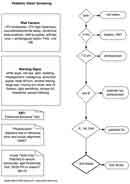Alaska Blind Child Discovery
Vision Screening
Home
The Purpose of Vision Screening is to detect progressive, serious pediatric eye disorders, and particularly amblyopia, in a cost effective manner and at an early enough time that treatment will be effective. Some tests work better than others in screening serious pediatric eye disorders. ABCD recommends age-appropriate guidelines. ABCD 2026 Favorites. It important to understand issues about Vision Screening Validation. A pediatrician will refer certain children for a confirmatory eye examination if that child has a positive family history of certain conditions, or if that child has certain medical conditions (Risk Factors). Parents should be vigilent for Warning Signs of Pediatric Eye Disorders. Since amblyopia is a condition characterized by decreased visual acuity in one or both eyes, sensory tests of monocular acuity and / or depth perception can identify patients with amblyopia or other pediatric eye disorders. Diopsys used a automated VEP "acuity" test. Parents can download a Home Acuity Test , download a Powerpoint HOTVAX test, or try the FAST. Amblyopia is often associated with poor focus (refractive error), poor alignment and/or disruptions of light getting into the eye, objective tests of the optics and anatomy of the eyes can detect risk factors early in (sometimes before) the onset of amblyopia. Objective tests include direct observation of reflected light in both pupils (Bruckner Test) or photoscreening. Other objective tests include remote autorefraction, foveal birefringence and visual evoked potential (VEP). Infants should have redreflex test and cover test. Objective Tests have increased benefit very EARLY, in Infants and toddlers. Instrument Screeners Compared The results or interpretations of vision screen tests modifies the need for, and ugency of, confirmatory eye examination. With insurance utilization of CPT code 99174 or 99177, pediatric practices should choose a photoscreener. |
ABCD History
Kids Eye Disorders
Amblyopia
Vision Screening
Issues
ABCD Clinics
References

Contact ABCD
Alaska Children's Eye


